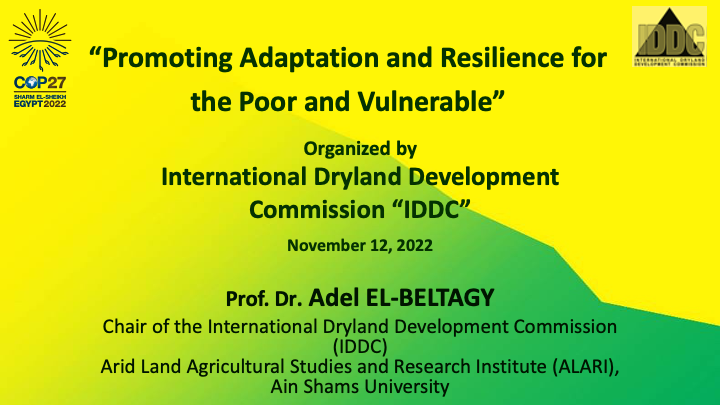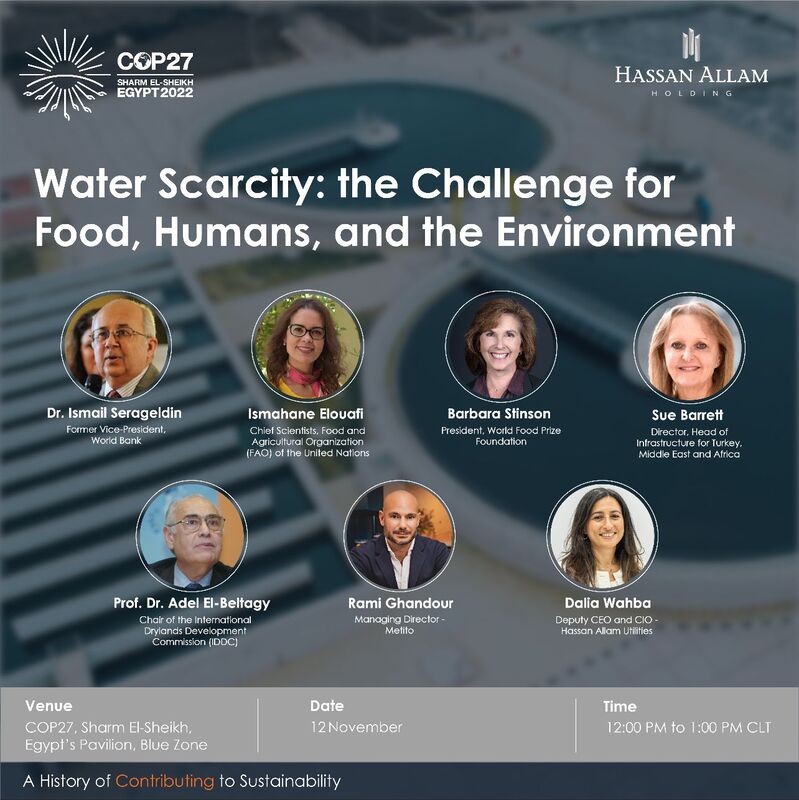International Dryland Development Commission (IDDC)
A brief History
The International Dryland Development Commission (IDDC) is an autonomous nongovernmental nonprofit organization established in 1978 by the individuals and institutions interested in sustainable development of dry areas. The commission promotes all aspects of dryland studies by fostering cooperation, collaboration and networking between various international, regional and national organizations.
One of the important modus operandi of the networking of IDDC has been to hold a major scientific conference every two to three years to provide opportunity to participants from around the world to exchange research results and experiences in dryland development and combating desertification. To date, the Commission has organized thirteen international conferences in different parts of the world where the dry lands predominate (Egypt, China, Iran, Mexico, USA, India).
Being non-governmental nonprofit scientific organization, the Commission depends on financial support from donor agencies and organizations that are interested in the sustainable development of dry areas, and production in dryland environments and promoting sustainable livelihood of the communities in dry areas to alleviate poverty and reduce hunger and malnutrition. In the past, several regional and international donor organizations and development institutions have contributed to the Commission’s activities.
Executive Board
(2018)
Chairman:
Adel El-Beltagy, Chair of the Food and Agriculture Council, Egyptian Academy of Science; Emeritus Professor, Arid Land Agricultural Graduate Studies and Research Institute (ALARI), Ain Shams University Cairo, Egypt; Former Director General, International Center for Agricultural Research in the Dry Areas (ICARDA)
Executive Secretary:
Mohan Saxena, Former Assistant Director General (At Large) ICARDA; Senior Advisor to ICARDA Director General; Fellow National Academy of Agricultural Sciences, New Delhi, India
Board Members:
Adel El-Beltagy, Chair of the Food and Agriculture Council, Egyptian Academy of Science; Emeritus Professor, Arid Land Agricultural Graduate Studies and Research Institute (ALARI), Ain Shams University Cairo, Egypt; Former Director General, International Center for Agricultural Research in the Dry Areas (ICARDA)
Executive Secretary:
Mohan Saxena, Former Assistant Director General (At Large) ICARDA; Senior Advisor to ICARDA Director General; Fellow National Academy of Agricultural Sciences, New Delhi, India
Board Members:
- Aly Abousabaa, Director General, International Center for Agricultural Research in the Dry Areas (ICARDA), Egypt
- Atsushi Tsunekawa, Professor, Former Director, Arid Land Research Center (ALRC), Tottori University, Tottori, Japan
- Ayman Abou-Hadid, Emeritus Professor, Arid Land Agricultural Graduate Studies and Research Institute (ALARI), Ain Shams University; Former President, Agriculture Research Centre, Egypt
- Ch. Srinivasa Rao, Director, ICAR-National Academy of Agriculture Research Management (NAARM), Rajendranagar, Hyderabad, India
- Djamin Akimaliev, General Director of Kyrgyz Agricultural Research Institute and Former President of Kyrgyz Agrarian Academy, Kyrgyzstan
- Donald Slack, Professor of Agricultural and Biosystems Engineering & Professor of Watershed Management and Eco-Hydrology, Cecil H. Miller, Jr., & Cecil H. Miller, Sr., Families Dean's Chair for Excellence in Agriculture and Life Sciences, University of Arizona, Arizona, USA
- J.A. (Hans) van Ginkel, Honorary Professor, Human Geography and Planning, Faculty of Geosciences, Universiteit Utrecht, The Netherlands
- Magdi Madkour, Emeritus Professor of Biochemistry, Arid Land Agricultural Graduate Studies and Research Institute (ALARI), Ain Shams University, Cairo, Egypt
- Mitsuru Tsubo, Professor, Arid Land Research Center (ALRC), Tottori University, Tottori, Japan
- Rajendra S. Paroda, Chairman, Trust for Advances of Agricultural Sciences (TAAS), Indian Agricultural Research Institute, Pusa Campus, New Delhi-12, India
- Tao Wang, Former President, Lanzhou Branch of Chinese Academy of Sciences (CAS); Director General, Northwest Institute of Eco-environment and Resources, CAS; Director and Professor, Key Laboratory for Desert and Desertification, CAS, China
- Zafar Adeel, Executive Director, Pacific Water Research Centre at Simon Fraser University, Vancouver, Canada
RACC/IDDC/ICARDA/ALARI Hybrid Webinar
Impact of Climate Change on Food Production in the Dry Areas
Hosted By Ain Shams University
SEPTEMBER 3-5, 2022
Cairo, Egypt
Link to Background note
LINK TO Final Program
Background note
(Arabic version)
Link to Proceedings
LINK TO Sponsors
COP 27 - UN Climate Change Conference
Sharm el-Sheikh Climate Change Conference - November 2022
As part of the Adaptation & Agriculture Day #cop27 Hassan Allam Holdings are hosting a panel around “Water Scarcity: The Challenge for Food, Humans, and the Environment”
“Water Scarcity: The Challenges for Food, Humans, and the Environment” panel at COP27.
Ismail Serageldin (Former Vice-President, World Bank)
ismahane elouafi (Chief Scientists, Food and Agricultural Organization (FAO) of the United Nations)
Dalia Wahba (Deputy CEO and CIO, Hassan Allam Utilities)
Barbara Stinson (President, World Food Prize Foundation)
Sue Barrett (Director, Head of Infrastructure for Turkey, Middle East and Africa)
Rami Ghandour (Managing Director, Metito)
Adel El-Beltagy (Chair of the International Drylands Development Commission IDDC)
#cop27 #development #environment #water #climatechange
ismahane elouafi (Chief Scientists, Food and Agricultural Organization (FAO) of the United Nations)
Dalia Wahba (Deputy CEO and CIO, Hassan Allam Utilities)
Barbara Stinson (President, World Food Prize Foundation)
Sue Barrett (Director, Head of Infrastructure for Turkey, Middle East and Africa)
Rami Ghandour (Managing Director, Metito)
Adel El-Beltagy (Chair of the International Drylands Development Commission IDDC)
#cop27 #development #environment #water #climatechange
The panel will discuss the idea of adaptation to climate change by reusing water to achieve access to clean water and sanitation and zero hunger, in addition to the potential for using water in green hydrogen production for clean and affordable energy.
Pre-COP 28 Webinar
Impacting Climate Change - Navigating Through Scales
Organized by
IDDC, RACC, NGIC, and ALYM
Impacting Climate Change - Navigating Through Scales
September 11-12, 2023
Hosted by
Alexandria University
Background Statement
PreCOP 28 webinar summary
Photo Gallery
September 11-12, 2023
Hosted by
Alexandria University
Background Statement
PreCOP 28 webinar summary
Photo Gallery


